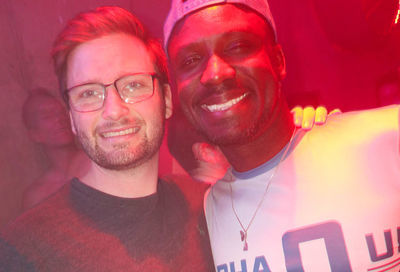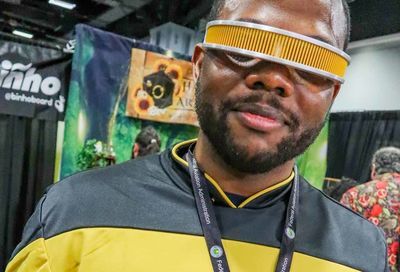EXCLUSIVE PHOTOS: Little Shop of Horrors comes into full bloom at Constellation Theatre
Get an exclusive look at Constellation's thrilling new production of the crowd-pleasing musical
[masterslider id=”38″]
Christian Montgomery is a “super fan” of Little Shop of Horrors. And the 27-year-old actor has been thoroughly engaged with the musical for a decade now.
“My high school did it, and I auditioned but didn’t get in,” he says. Instead of sulking, he tried for a role backstage, landing the Assistant Stage Manager post. “I was still involved with the production, so I learned every line of the show. And then I’ve just been singing it in my car for the last ten years. When Constellation announced they were having auditions for it, I was super-pumped.” He was also beyond ready.
“He came in to audition and he had little glasses, and it just made me swoon,” says Nick Martin, director of Constellation Theatre Company’s production of the crowd-pleasing musical by Howard Ashman and Alan Menken (Disney’s Beauty and the Beast). Having worked together on two previous productions at Constellation, Martin was already aware of Montgomery’s talent — enough that the actor’s zeal to play Seymour sealed the deal. “He’s such an underrated actor in this city, and just so smart, and hardworking, and an absolute joy to work with,” says the director.
Montgomery has become a regular on stages around town, gaining notices as a standout supporting actor in shows ranging from Monumental’s Be More Chill to Keegan’s Hair, American Idiot, and Next to Normal, the latter two of which earned him Helen Hayes Award nominations.
Yet, until now, Montgomery has never been the veritable star of a full-scale, full-length musical. The role of Seymour certainly seems to fit the exuberant young actor like a glove. For one thing, the actor has worked to portray his character as if he’s an extended member of his own family. “My whole family is from Long Island, so I have a lot of source material to pull from for the accent,” he says. “I have voicemails from my uncle that I can pull up for reference.”

Montgomery is supported by a talented eight-person ensemble, as well as the handiwork of designer Matthew McGee, who created the show’s various incarnations of the flesh-eating plant, Audrey II. The plant is at the root of both Seymour’s happiness and the floral shop’s horror. And yet, as Montgomery puts it, “most Little Shop of Horrors [productions] rent this kind of tired-looking puppet throughout the country.” There’s nothing tired-looking about the plant that grows three puppet sizes on stage in the intimate Source theater space. “The puppet is worth the price of admission alone,” Montgomery grins.
“The absolute most exciting thing about our production is Matt’s puppet design,” Martin says. “I just think it’s out-of-this-world awesome. I’ve never seen any production where the bigger pods are able to be so articulate and alive, which is just so cool for the show.”
“I wanted to try some new techniques that I hadn’t seen done before for Little Shop that I thought would fit in the space but also be exciting and surprising,” says McGee. “In addition to minor decorative touches that “almost look like eyes,” McGee’s two largest pods are manipulated in a way unlike “what you’d normally see on stage. There’s usually someone inside the puppet operating.” Here, puppeteer Rj Pavel stands behind Pods 3 and 4 to operate them, allowing “the giant plant [to be] coming out of its pot and be able to dance around and wiggle its legs.” It took a lot of time and effort to get fully to that point.
“You can’t anticipate how long [it will take],” says McGee, who works as frequently as an actor on stage as he does a designer on set. (The California native won a 2012 Helen Hayes Award for Supporting Actor in Constellation’s Taking Steps.) “You give yourself so much time to build a puppet and then it always takes longer.” It takes longer still these days, as McGee juggles work with family, specifically his duties of raising a three-year-old boy with his wife.
Martin has a different juggling act when it comes to work vs. family, and the life the 28-year-old leads with his partner of over five years, Frank Labovitz — the acclaimed local costume designer who often works alongside Martin, as he did with Little Shop. “You run into the problems of, you’re both home after exceptionally long days and don’t want to talk about work, but you inevitably end up talking about work: ‘How are we going to solve this problem?’ And then it’s two in the morning and you both just wanted to go to bed. But I really do think he is one of the most talented costume designers in the city, so getting to work with him is always an absolute delight.”

Labovitz helped Martin distinguish this production in several other key ways. Take, for example, the trio of street urchins who serve as the production’s “do wop” Greek Chorus. “Getting to see them bop out of their day looks into girl group attire, in the moments where they’re more acting as narrators outside of the action of the show, is a fun little take,” Martin says.
More significantly, Labovitz helped Martin alter the show’s traditional stage ending in a subtle, cosmetic way that makes it more hip and contemporary. “It kind of [developed as] Frank and I were talking about how the mix of genre ideas in the play is kind of super-interesting but also kind of imbalanced. And we always felt like the horror/B-movie side of things gets a little underplayed, with the exception of [the] dying plant eating people. Was there a way that we could thread that back in more?”
It doesn’t give much away to say that, from there, Martin came up with the broad notion of ending the show with “plant zombies.” McGee calls the ending “really fun and whimsical, and also just the right level of macabre and creepy for Halloween. It’s such a high-octane boost of theatrics, and it just makes me happy.” Montgomery agrees. “I love our ending,” he says. “I think it’s the right amount of camp, where the show and Frank’s costumes really bring it to life.”
“It’s a beloved piece of musical comedy that is really well-constructed,” Martin says. “But as soon as you start digging into these characters and the relationships and the reality of what is going on, it has a lot of complicated and messy things to say about class, and sexism, and gender politics, and domestic abuse…. We’re still trying to find a compelling comic sensibility with the show. I’ve seen a lot of productions where people push really hard into the idea of being campy, which I think ends up undercutting some of the emotional truth for the characters. Obviously we’re still making jokes and have lots of fits and silly things happening, but I’m hoping that it lets us in on the lives of all of these characters without making them the object of the joke.”
“The show has a great message,” Montgomery says. “[It’s] very much a cautionary tale…. Even the last number, ‘Don’t Feed The Plants,’ warns the audience to stay true to who you are and don’t get wrapped up with desires and wants.”
It’s a message that the sweet, personable, and grounded Montgomery seems to have little trouble heeding — even now, when everything is seemingly going his way. (That’s true outside of the theater, too: Montgomery lives in Logan Circle with his partner of four years and a three-legged rescue cat named Charlie, whom he calls “the love of my life.”)
Little Shop is “if not number one, top three” on Montgomery’s bucket list of favorite shows. “This is an absolute dream come true for me,” he says. “I just have to keep reminding myself to live in the moment and enjoy every second because this is really a peak in my career, and my life. And I’m just so happy to be here doing it every day.”
Constellation Theatre Company‘s Little Shop of Horrors runs through Nov. 17 at Source Theatre, 1835 14th St. NW. Tickets are $19 to $55, plus fees. Call 202-204-7741 or visit www.constellationtheatre.org.
Support Metro Weekly’s Journalism
These are challenging times for news organizations. And yet it’s crucial we stay active and provide vital resources and information to both our local readers and the world. So won’t you please take a moment and consider supporting Metro Weekly with a membership? For as little as $5 a month, you can help ensure Metro Weekly magazine and MetroWeekly.com remain free, viable resources as we provide the best, most diverse, culturally-resonant LGBTQ coverage in both the D.C. region and around the world. Memberships come with exclusive perks and discounts, your own personal digital delivery of each week’s magazine (and an archive), access to our Member's Lounge when it launches this fall, and exclusive members-only items like Metro Weekly Membership Mugs and Tote Bags! Check out all our membership levels here and please join us today!























You must be logged in to post a comment.